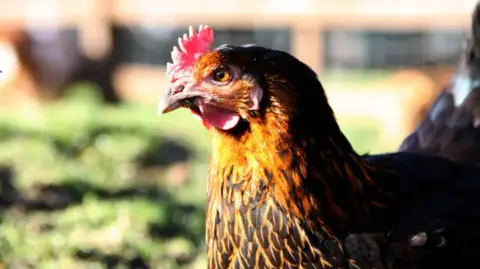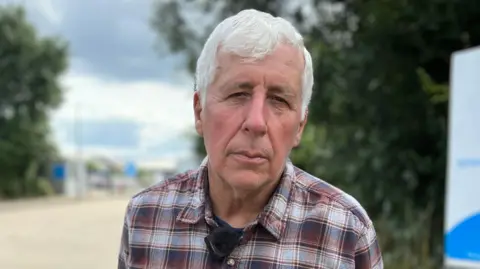Concern over plan to increase size of chicken farm
 BBC
BBCThere have been calls for plans to almost triple the size of a chicken farm to be rejected over pollution fears.
Bradfords Farm in Newbury, Berkshire, near the River Kennet, is currently home to 12,000 chickens, but the new plans would see that increase to 32,000.
Martin Salter, head of policy at the Angling Trust, said the proposal, lodged with West Berkshire Council, was "utterly unacceptable" and "presents a clear and present danger to the river and the wildlife the river sustains".
Developer Harrison Pick Ltd said the proposed new buildings would be better for the environment.
Mr Salter, who is also the former Labour MP for Reading West, said: "Chicken manure is highly toxic.
"Obviously, if it's spread on the ground or leaks out of these units, and it's bound to given it's actually in the flood plain very close to the river, it mixes with surface water and leaches into the river and into the ground water, it creates a huge phosphate spike."

The River Kennet is one of 260 chalk streams in the world, and home to critically endangered species like the European eel.
Director of Harrison Pick Ltd Ian Pick said: "This site has been used for free range hens for the last 20 years.
"There's no real change in the use of the site. What we are changing is the style and type of the building.
"For example, the six buildings that are there now are very old, they've got no floors in them, so all the existing manure generated by the birds in the existing sheds just drops on the floor.
"Our new shed is designed to the best available techniques.
"The volumes of nitrate from a free range egg system are just insignificant."
About 55% of land in England is in an Environment Agency nitrate vulnerable zone, including Bradfords Farm.
Farmers in these areas must follow special rules to stop run off into rivers.
The Environment Agency said it had commented on the proposals highlighting the environmental sensitivity of the farm's location and seeking more information.
A spokesperson said: "Excess nutrients of any kind can be damaging to our rivers.
"The controls in the relevant regulations set out how farmers should store and use nutrients to minimise the risk of pollution or environmental harm occurring.
"It is an offence to cause or knowingly permit polluting matter to enter any controlled waters."
You can follow BBC Berkshire on Facebook, X (Twitter), or Instagram.
